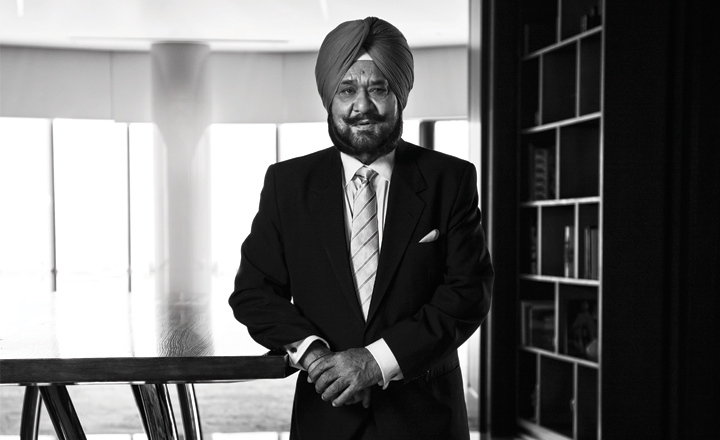Patiala has been synonymous with sports ever since the days of His Highness Maharaja Bhupinder Singh, the famous ruler of the erstwhile State of Patiala. From cricket to polo, to wrestling, and even roller hockey, there have been champions who were mentored by the state, while the maharajas themselves were superlative polo players, cricket players, and shooters.
We meet the grandson of Maharaja Bhupinder Singh, Raja Randhir Singh, who, besides being an Arjuna Award-winning shooter, is a highly awarded sports administrator who has been on the world’s topmost sporting committees. He’s been a lifetime member of the International Olympic Committee, the Indian Olympic Association (1984-2014), and secretary general, then vice-president of the Olympic Council of Asia, that runs the Asian Games (1991-2014 and 2014-), and also vice-president of the Commonwealth Games Federation.
Sports clearly run in the bloodlines of Patiala. Maharaja Bhupinder Singh brought in the first Australian team and the Marylebone Cricket Club teams to India, playing for the latter in India. “The 1911 India team that went to England was captained by him,” says Raja Randhir. “Even the Ranji Trophy was donated by my grandfather in memory of Kumar Shri Ranjitsinhji, Jam Sahib of Nawanagar.” Adding to the list is the Cricket Club of India that was built by the Maharaja in Bombay. “Yuvraj Yadavindra Singh, his son, captained India in cricket, in 1934,” he says. “Maharaja Yadavindra Singh started the Asian Games movement in 1951.”
And before him, Maharaja Bhupinder’s father Maharaja Sir Rajinder Singh, a nine-handicap polo player, who started Patiala’s polo tradition, was also a great cricket player, who also enjoyed pig-sticking and riding. “At one time, we had four nines (handicap players) playing for Patiala. We had a 36-goal team, which is the highest you could have,” says Raja Randhir. “And the great Gama pehlwan (wrestler) was also from Patiala; he even beat the then reigning world champion.”
Raja Randhir Singh tells us about his grandfather starting the Indian Olympic Committee. “From 1928 onwards until now, we had one member of the family in the IOC,” he says. “First Maharaja Bhupinder Singh, after that, my uncle, Maharaja Yadavindra Singh, then my father Raja Bhalindra Singh, then me, and now my daughter Sunaina Kumari who is a joint secretary in the Indian Olympic Committee. My nephew Yuvraj Raninder Singh of Patiala, son of Captain Amarinder Singh, is the president of the shooting federation of India and is a silver medallist at the national level.
With such a formidable family association with sport, this brings us to shooting, Raja Randhir’s sport of choice. He had just joined St Stephens in Delhi when in January 1963, he was encouraged by his maternal aunt, Mrs Sandhu, a national-level women’s shooting champion, to join a national level shooting competition, just as he was leaving for a hunt with his maternal grandfather. “I shot 25 out of 25 to win the Juniors,” says Raja Randhir. “I had never shot seriously. As a child, I had seen my father and uncles shoot clay pigeons. And at this particular competition, Maharaja Karni Singh of Bikaner and his son Yuvraj Narendra Singh (who was my age), were also shooting.” Thus began Raja Randhir’s long association with Karni Singh (who was 20 years older), and like him, participated in five Olympics in mixed trap. Raja Randhir won gold at the 1978 Asian Games in Bangkok, and a silver in the 1982 Asian Games in Delhi. “Maharaja Karni Singh was a great shotgun shooter, but also a pistol and rifle shooter. He was world class,” says Raja Randhir. He still treasures the single trigger Westley Richards gun made especially for Maharaja Bhupinder Singh, also a great shot. “That was the one I won my first competition with,” he reminisces. He does wish he could have won an Olympic medal for India. “In those anti-apartheid days, I missed a lot of world events held in South Africa and what was then Rhodesia,” he says. “And then came the Olympics every four years, so we were restricted in terms of competition.”
The former shooting champ, who has been awarded the Association of National Olympic Committees Merit Award, the highest possible for sports administration, is positive about India’s medal hopes. “Indian sportsmen are getting close to winning medals, we are coming 4th or 5th,” he says. He praises the government for infrastructure in cities created for national games, and just wants to see top class coaches brought in. His own daughter Rajkumari Rajeshwari Kumari, India’s shooting champion, whom we will see in season eight of the upcoming heritage exposition Royal Fables in New Delhi, is poised for medals at the upcoming Commonwealth Games and Asian Games, and even the Tokyo Olympics in 2020. “I’m confident she will win, as she’s got one of the best coaches in the world,” says Raja Randhir. And the legacy continues.












 Just one email a week
Just one email a week